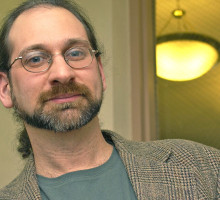
Reviews
In this wide-ranging exploration, Gimbel... seeks to discover whether and to what extent Einstein’s work could legitimately be called 'Jewish' and what difference it makes.
Gimbel spins out what could have been a mere provocation into a wide-ranging and entertaining collision of science, history, philosophy, and religion.
Gimbel is an engaging writer... he takes readers on enlightening excursions through the nature of Judaism, Hegelian philosophy, wherever his curiosity leads.
[A] lively, intentionally provocative and wholly compelling inquiry into the Jewishness of Einstein himself and the world-changing scientific revolution that he set in motion.
Reaching back into the first half of the twentieth century, Gimbel returns with absorbing stories about Albert Einstein and his life as a politician, brilliant scientist, and Jew.
For anyone interested in the history and philosophy of science, this book is well worth reading to its delightful conclusion.
The author explores the question of whether a scientist's religious and cultural/ethnic heritage colors the way he/she does science.
The author and his book do a wonderful job in framing the time, and the science, and the politics, and the religion.
The ugly, public assault on Einstein in early 1920s Germany is the starting point... The attack on Einstein is thoroughly and clearly described and placed in its historical and political context. There is no better English-language source on the topic. But Gimbel quickly turns the whole question upside down, asking with more than a little, deliberate irony whether there might not, in fact, be some truth to the characterization of Einstein’s physics as, in some sense, 'Jewish.' What follows is a fascinating and enlightening discussion of many aspects of the scientific, philosophical, religious, cultural, and political history of the 20th century that examines the many different ways in which one might understand the suggestion that Einstein’s physics expresses or reflects something distinctively Jewish.
To understand Gimbel’s argument about the Jewish quality of Einstein’s approach—and to perceive the boldness of Gimbel’s decision to re-examine twentieth-century, anti-Semitic ideas about 'Jewish science'—it’s necessary first to understand the historical moment out of which the theory of relativity emerged.
A fascinating engagement with the nature of Judaism and of science. By exploring and, in a sense, redeeming the Nazi accusation that Einstein's relativity theory is 'Jewish science,' Gimbel not only challenges the racist meanings of that charge but shows how scientific theories must in fact reflect the issues and concerns of the historical periods which give rise to them. This book is certain to generate much interest and will stimulate an important and understudied debate.
From its unnerving premise—maybe the Nazis were right, and Einstein’s physics is 'Jewish science' after all—to its contrarian conclusions, Einstein’s Jewish Science is a bruiser of a book. It asks questions and floats hypotheses that strain academic etiquette. With unflagging 'out-of-the-box-itude,' Gimbel reinterprets modern science and modern Judaism in a way that is sometimes exasperating, often challenging, frequently inspired and always riveting. You may not be persuaded, but after grappling with this book, you are sure to see in a new light both science and Jews of the twentieth century.
Book Details
Introduction: Einstein's Jewish Science
1. Is Einstein a Jew?
2. Is Relativity Pregnant with Jewish Concepts?
3. Why Did a Jew Formulate the Theory of Relativity?
4. Is the Theory of Relativity Political
Introduction: Einstein's Jewish Science
1. Is Einstein a Jew?
2. Is Relativity Pregnant with Jewish Concepts?
3. Why Did a Jew Formulate the Theory of Relativity?
4. Is the Theory of Relativity Political Science or Scientific Politics?
5. Did Relativity Influence the Jewish Intelligentsia?
6. Einstein's Liberal Science?
Conclusion: Einstein's Cosmopolitan Science
Acknowledgments
Notes
Bibliography
Index





